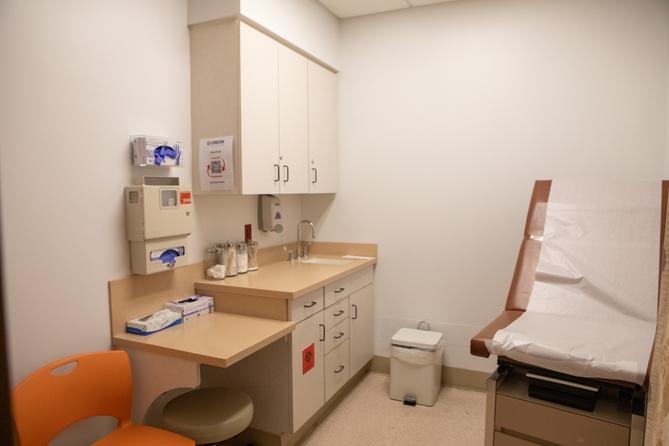HARRISBURG — President Donald Trump’s “big, beautiful” budget bill could have a disastrous effect on the health of rural Pennsylvanians and the operations of the hospitals and other medical centers that care for them.
The federal budget proposal, which passed the U.S. House by a one-vote margin in May, calls for nearly $800 billion in Medicaid cuts over the next decade. It also includes a new 80-hour-per-month work or service requirement for Medicaid recipients between the ages of 19 and 64 who aren’t caregivers or who have disabilities. Among other changes, the bill would require verification of coverage eligibility every six months rather than annually.
While supporters of the budget bill argue that it will slow spending and safeguard government programs, critics say the cuts and new requirements will create more paperwork for states and make it harder to access essential care. Opponents also argue the changes would push struggling rural hospitals and other providers to the brink, and force them to scale back services or close entirely.
More than 3 million people in Pennsylvania — 23% — are covered by Medicaid, according to data from the state Department of Human Services, which administers the program. The agency estimates that more than 300,000 would lose Medicaid coverage under the proposal.
Val Arkoosh, secretary of the department, said the bill would not only hurt those losing coverage but “all of us who would face the real-life consequences of crowded emergency departments, increases in the cost of health insurance, and the catastrophic effects on economies and health systems in rural areas.”
More than 737,000 Medicaid recipients live in rural counties, where residents are typically older and more reliant on government-funded insurance programs. Such programs reimburse at lower rates compared to private insurance companies and haven’t kept up with inflation.
Cameron County Commissioner James Moate, a Republican, said the Medicaid reimbursement rate should have never been less than 100%.
“That’s why we have struggling hospitals,” he told Spotlight PA.
On average, Pennsylvania hospitals absorb a loss of 18 cents on the dollar for care provided to Medicaid patients, said Nicole Stallings, president and CEO of the Hospital and Healthsystem Association of Pennsylvania, which represents more than 230 hospitals statewide. In rural communities, the average loss is 26 cents on the dollar, she added in a May statement.
“Medicaid plays a vital role in the health of rural residents, and it is important to preserve this funding so that families can continue to access the care they need for healthier lives,” said Douglas Winner, chief financial officer for Penn Highlands Healthcare, a nonprofit system with nine hospitals in rural counties.
Penn Highlands President and CEO Steve Fontaine has told lawmakers that consolidating with other health systems and expanding into new areas has helped facilities survive. This strategy, which has helped Penn Highlands diversify its patient and insurance bases, is why the system expanded into Centre County, where resident numbers are expected to grow, he told lawmakers last year.
Still, the health system has shuttered services and reported operating losses over the past year.
Winner said Penn Highlands is “greatly concerned” about the proposed Medicaid cuts.
“Rural hospitals have experienced substantial cost increases for labor, drugs, and supplies,” he said in a statement. “Coupled with decreasing volumes, inadequate reimbursement rates, and ongoing staffing shortages — recruitment and retention — we are struggling financially.”
Advocates worry the cuts in the federal budget will force rural hospitals to slash services even more or close altogether. And once facilities end a service or shut down, they rarely reopen, Stallings told Spotlight PA.
Community health centers could also be strained. These facilities, also known as federally qualified health centers, provide services regardless of someone’s ability to pay and primarily see patients who use Medicaid and PENNIE, the state’s Affordable Care Act marketplace.
More uninsured people will likely lead to an increase in uncompensated care, said Eric Kiehl, director of policy and partnership for the Pennsylvania Association of Community Health Centers. And these facilities are already strapped for resources, he told Spotlight PA.
A surge in demand could cause these health centers to shutter core services — such as medical, dental, or behavioral health — reduce hours, or close, Kiehl said.
Pennsylvania’s U.S. House delegation voted along party lines on the federal budget bill, with Republicans supporting and Democrats opposing the proposal.
Medicaid spending totaled roughly $44 billion in fiscal year 2023. The federal government provided almost $28 billion of those dollars.
Democratic Gov. Josh Shapiro has said the state won’t be able to make up those dollars to support the Medicaid program. In a statement, Shapiro said he hopes “common sense and a concern for the people of Pennsylvania” will prevail in the U.S. Senate, where Democratic U.S. Sen. John Fetterman and Republican U.S. Sen. Dave McCormick disagree on aspects of the bill.
McCormick did not respond to a request for comment for this story. He has expressed support for the budget bill, which he says will reduce and slow government spending. During a Fox News forum, McCormick said he isn’t advocating for taking benefits from “vulnerable people” but is trying to ensure “people for whom the program was designed” benefit.
Fetterman called the plan “a bad bill,” telling Spotlight PA in a statement: “Republicans want to put more money in the pockets of the ultra-rich at the expense of hundreds of thousands of Pennsylvanians who will lose access to Medicaid if this disastrous bill is passed.”
